After witnessing a gradual divestment in our nation’s children in recent years and seeing that the COVID global pandemic and economic recession negatively impacted every aspect of the lives of children, voters firmly believe that it is time to make investments in our nation’s children and making their best interests and child well-being a top priority.
Based on a nationwide poll conducted by Lake Research Partners of 1,000 likely voters with oversamples of parents, Black, and Hispanic voters in May 2022, voters expressed strong support for making increased investments in children and prioritizing the education and health of children and in alleviating child hunger, child poverty, child homelessness, and child abuse and neglect.
Voters Believe We Are Spending Too Little on Children
By a wide margin, voters believe the U.S. is spending too little on children (56% too little to 10% too much).
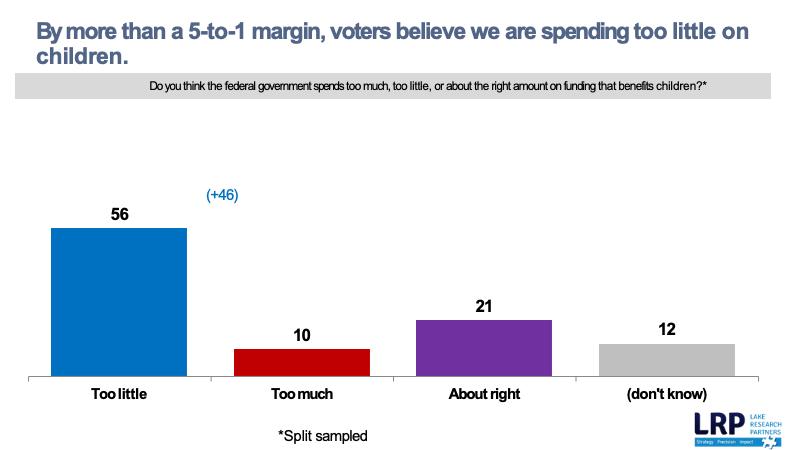
When it comes to more specific policies, the percentage of those who believe we are spending too little often rises. For example, when it comes to reducing child poverty (66-10%), accessing mental health services (66-9%), reducing child abuse and neglect (66-7%), and reducing child homelessness (65-8%), voters overwhelmingly believe we are spending too little rather than too much on children. The margin for voters who believe the country is spending too little on children rises to nearly 13-to-1 with respect to reducing child hunger (64-5%).
American voters also believe that we are spending too little rather than too much on public education (60 too little to 14% too much) and assistance for child care expenses (56-14%). With respect to early childhood education, the gap mirrors the overall figure at 56-10%. And with respect to providing affordable child health coverage (49-8%), the margin rises to more than 6-to-1.
Furthermore, although the poll was conducted before the shootings in Buffalo and Uvalde, voters believed we were making too little investments for children on the issue of preventing gun violence by a 53-16% margin.
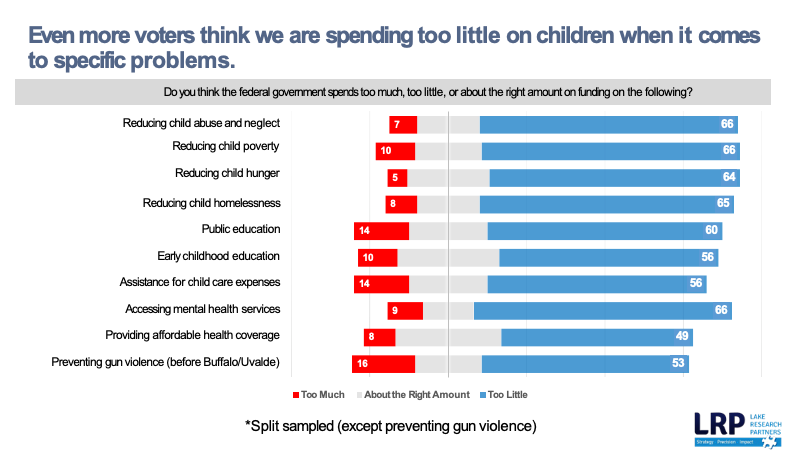
Voters believe making investments is inherently positive to children themselves but also for the nation as a whole. For example, by a 90-8% margin (77% strongly agree), likely voters agree that “investing in children helps improve their lives, development, and outcomes.” Those polled also agree with the argument that “investing in children has a large return in a healthy society and a healthy economy” (89-7% margin and 76% strongly agree). Other results are as follows:
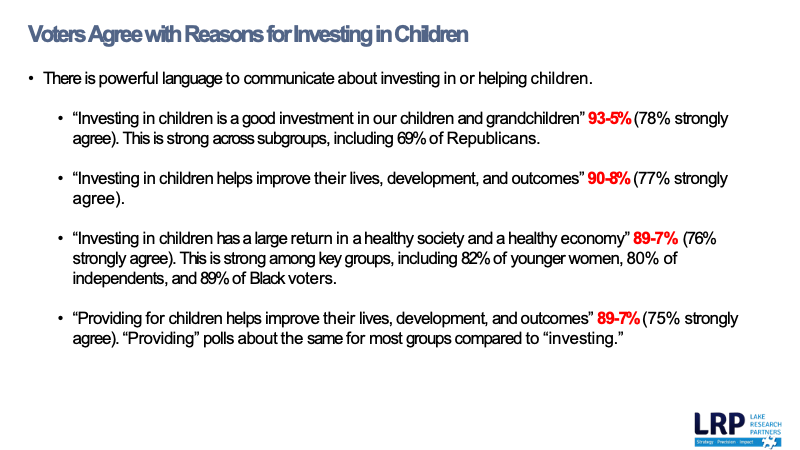
Voters Overwhelmingly Favor the Child Tax Credit and Efforts to Reduce Child Poverty
Likely voters also support enacting policies that would address the economic well-being of children and families, such as preventing the rollback of the Child Tax Credit (CTC), and the recognize that cutting child poverty is fundamental to our nation’s success.
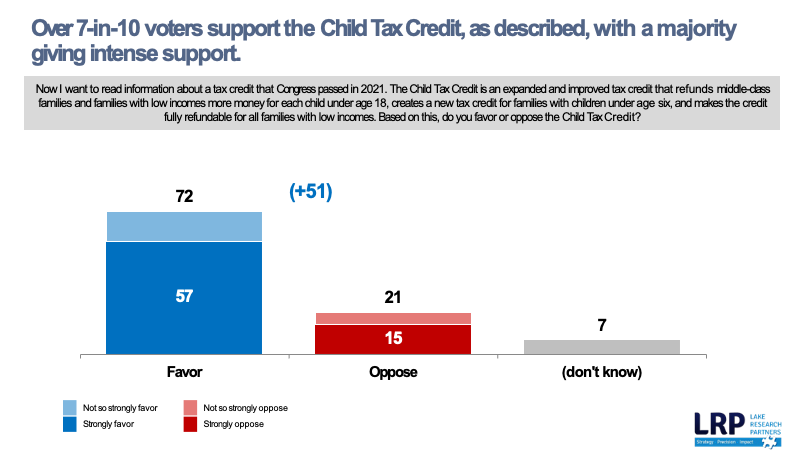
As the Lake Research poll found, voters overwhelmingly favor extending the expanded and improved CTC that was included in the American Rescue Plan (ARP) Act by a 72-21% margin with parents supporting the policy by a 77-18% margin (63% strongly favor).
Across party identification, voters favor extending the expanded and improved CTC: 90-7% among Democrats, 62-22% among Independents, and 55-37% among Republicans.
Women favor the CTC by a 73-18% margin and favorability among men remains high at 71-24%.
Favoring the CTC is strong regardless of race, as White voters favor the CTC at 70-23%, Black voters at 86-7%, and Hispanic voters at 79-16%.
Polling question for CTC: “The Child Tax Credit is an expanded and improved tax credit that refunds middle-class families and families with low income more money for each child under age 18, creates a new tax credit for families with children under age six, and makes the credit fully refundable for all families with low incomes. Based on this, do you favor or oppose the Child Tax Credit?
In addition to the more than 6-to-1 margin of voters (66-10%) believing our nation spends too little on “reducing child poverty” (as noted above), the American people also expressed concern (86% concerned to 12% not concerned with 61% very concerned) when presented with data indicating that “child poverty costs our society up to $1.1 trillion a year due to higher crime, poor health outcomes, and lower income levels when children living in poverty grow up.” Democrats expressed concern by a 97-3% margin, Independents at 82-16%, and Republicans at 75-19%.
By an 83-13% margin (60% very concerned), voters also expressed concern that the level of child poverty was “59 percent higher than the level of adult poverty in America and that negatively impacts all aspect of the lives of children, including their health, education, and safety.”
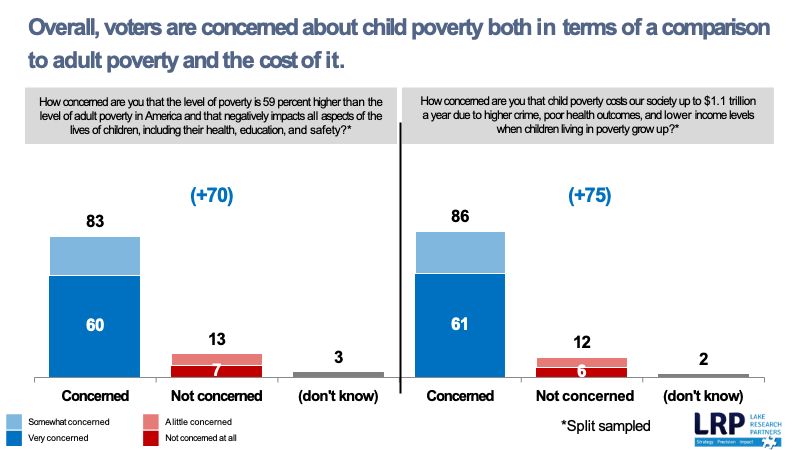
Voters Strongly Favor Making the Children’s Health Insurance Program Permanent
There is also strong bipartisan legislation in Congress to make the Children’s Health Insurance Program (CHIP) permanent, just as are all other federal health coverage programs. In the Lake Research poll, voters overwhelming favored such legislation (78% favor to 14% oppose with 66% who strongly favor making CHIP permanent). Similarly, CHIP is salient, as 79% believe it is either very or somewhat important for Congress to permanently fund CHIP.
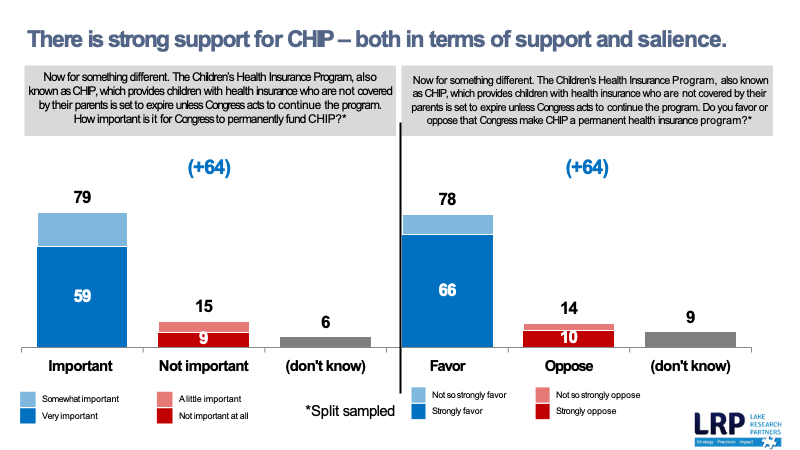
Again, across party identification, voters favor making CHIP a permanent health insurance program: Democrats (94-2%), Independents (78-13%), and Republicans (60-26%).
Women favor making CHIP permanent by an 83-7% margin and men do so at 72-21%.
By wide margins, White (76-15%), Black (90-6%), and Hispanic (83-11%) likely voters favor making CHIP permanent.
Voters Also Favor Creating an Independent Children’s Commissioner
Although it is typically more difficult to garner public enthusiasm for system reforms and government restructuring, the American people have seen a number of reports in recent years with respect to institutional abuse of our nation’s children and harm that the COVID pandemic has had on kids. Consequently, even with respect to a question focused on system change, voters favor (57-27%) the creation of an independent Children’s Commissioner in our country to help “protect and improve the care and well-being of children in our country.”
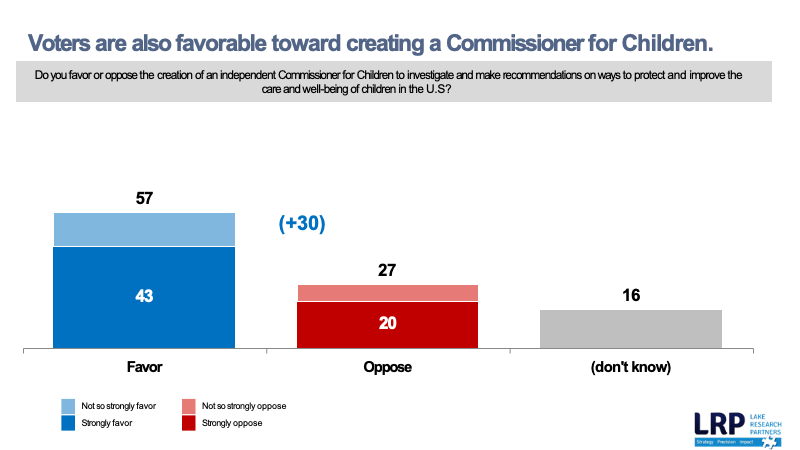
Voters Agree with the Creation of “Best Interests” and “Child Well-Being” Standards for Government Policy Development
With respect to the development of federal government policy that involve children, voters expressed wide agreement that such policies should “always by governed” by either a “best interests of the child standard that either makes the safety and the protection of children the first priority” (82 agree to 10% disagree) or adopts a “standard that makes child well-being the first priority” (82-9%).
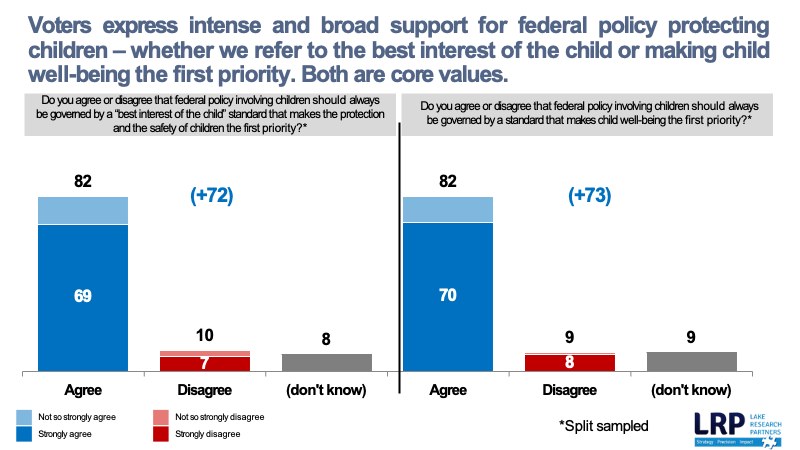
Again, agreement with prioritizing children is strong across gender, racial, and party identification lines. For example, with respect to establishing a “best interests of the child standard,” Democrats agree with the policy change by 91-3%, Independents by 81-17%, and Republicans at 75-16%.